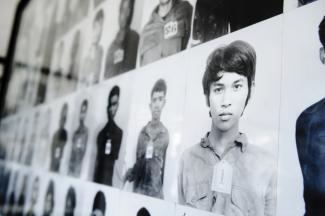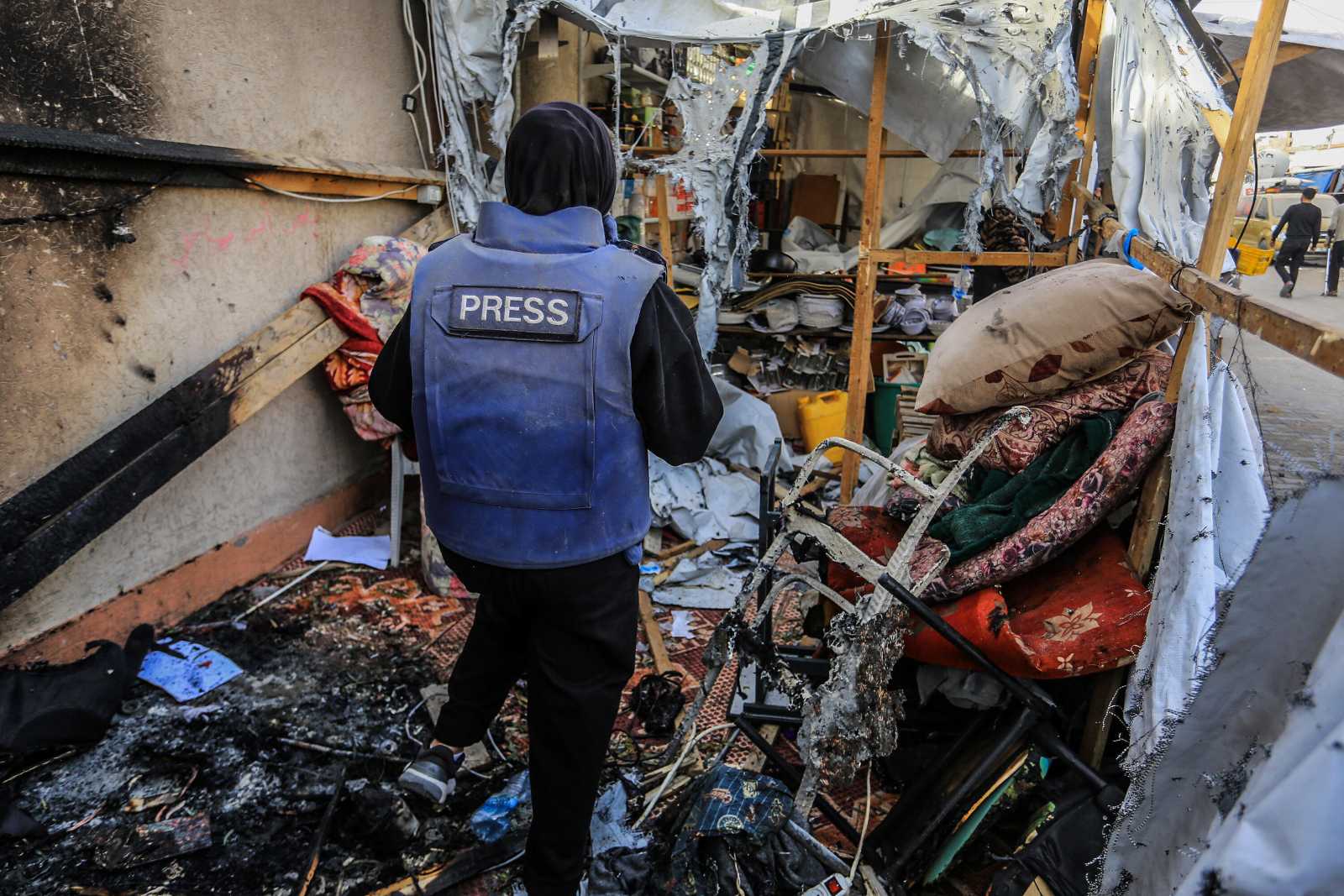Cambodia
Dealing with the past

Sun Py was nine years old when he was separated from his parents and three siblings in 1976. He survived the horrors of the Khmer Rouge regime but suffered considerable distress as a result of losing his family and not knowing what had become of them. Thirty-four years later, Sun Py found those he had lost with the help of a TV programme. Cameras recorded the reunion, capturing the moment when he embraced his mother for the first time and broke down in tears.
A year later Sun Py was interviewed by Ly You Y and Lay Rattana for their documentary film “Finding Lost Ones”. He told them: “I feel very happy, both physically and mentally.” He added: “I know my identity.” His mother, who had thought her son dead, described her relief: “I feel like I have recovered from all my illness.”
One of the two film-makers who shot the documentary about Sun Py and others, Ly You Y, is 22 years old. That is the average age of the Cambodian population. Like more than 60% of her compatriots, she did not directly experience the Pol Pot dictatorship from 1975 to 1979. Even so, she was affected by it in a deeply personal way: “My mother lost three of her six brothers and sisters during that time,” the young woman explains. Ly You Y made her film in 2011 as part of her studies in the Department of Media and Communication (DMC) at the Royal University of Phnom Penh. The project was supported by the Civil Peace Service (CPS) of GIZ.
However, the film-maker had less luck than her main character. Her relatives are still missing: “We did everything we could to find them. But now we have no hope anymore.” They remain among the hundreds of thousands of people who disappeared without trace. For the TV programme “It’s not a Dream”, which reunited Sun Py with his family, Cambodian broadcaster Bayon reported receiving at least 20 missing persons enquiries a day.
Years of terror
Most people search in vain. An estimated 1.7 million fell victim to the Khmer Rouge. That was approximately a fifth of the population at the time. Men, women and children lost their lives in the “Killing Fields” or on death marches. Others starved or died as forced labourers, succumbing to untreated diseases or wounds inflicted by torture. Children witnessed their parents’ execution, wives and husbands saw their partners turned into murderers. Everyone fought for their own survival, humanity disappeared from society.
Every family in Cambodia was affected by the genocide – as victims, perpetrators or in many cases both. Anyone who disobeyed orders paid with their own life. Many who became murderers thus see themselves as victims, forced to commit crimes against their will. The consequences are feelings of guilt and shame – and a widespread inability to talk about personal experiences. Even many Khmer Rouge lost family members.
Under Pol Pot, Cambodians suffered a collective trauma that was even passed down to later generations. “Traumatised parents are often unable to offer guidance to their children,” explains trauma counsellor Heidrun Ziegler, who worked as a Civil Peace Service (CPS) expert in Cambodia from 2002 until 2006. “Even if adults in a child’s immediate social environment can control their emotions, that child will sense the pressure they are under. In some cases, a child may even develop the same symptoms as its deeply traumatised mother, but it cannot explain where they come from.”
Psychological problems
In the 2012 Cambodian Mental Health Survey conducted by the Royal University of Phnom Penh’s Department of Psychology with GIZ financial support, more than 30 % of women and nearly 20 % of men complained of anxiety disorders. 20 % of women and 10 % of men suffered from bouts of depression. Symptoms associated with post-traumatic stress disorder (PTSD) were reported by three percent of the women and 1.6 % of the men in the sample. The suicide rate in Cambodia is the highest in Southeast Asia.
Psychologists at the university are currently working on a youth distress screener, an instrument to identify stress factors among young people. The methodology needs to be tuned to the culture. “The questions we ask to ascertain psychological disorders in a Western survey are not necessarily right for Cambodia,” explains Swiss team member Elizabeth Högger-Klaus.
In 2008, the university introduced a master’s programme in psychology, which is now being revised to focus on family therapy. “As the so-called second post-Khmer Rouge generation, children and young people are an important target group and we want to accommodate them by looking at the whole system in which they live: family, friends and school,” says Högger-Klaus.
She points out that psychological disorders are not due only to the reign of terror. Poverty, domestic violence and impunity have also played an important role. She sees the problem as one of more than just collective trauma; the cultural and religious context matters too (see side-bar link "Background information). The fact that the country today is ruled by former Khmer Rouge is another obstacle to dealing with the past. They are ministers, provincial governors and village chiefs. Even Prime Minister Hun Sen is ex-Khmer Rouge and shows no interest in revisiting the past.
But Hun Sen could not indefinitely oppose the trial proceedings demanded for decades by the international community. After long negotiations with the United Nations, the Khmer Rouge Tribunal started work in 2006. Presided over by both Cambodian and international judges, the special court is tasked with bringing the most responsible members of the Khmer Rouge to account. However, many victims are disappointed in the court because it has so far convicted only one perpetrator.
Nevertheless, the court has made the past a public issue. National and international media report on the trials, thousands of victims have been involved in the proceedings. Civil-society organisations grasped the opportunity of campaigning in the context of the tribunal.
Village work
Kdei Karuna is one such initiative. The CPS partner organisation operates a “Justice and History Outreach Program” designed to promote communication about the past in villages and communities – also between parents and children. Workshops are staged to identify community-specific needs and requirements and local moderators are trained in conflict management and dialogue facilitation to support the relevant processes.
Sometimes village elders get together with young people and relate their experiences under the Khmer Rouge. Sometimes they express experiences in artworks – which then help them talk about what happened – or the subject is introduced by a film on the experiences of survivors. According to Tim Minea, the Cambodian sociologist who leads Kdei Karuna, the communication initiated in the villages has resulted, for example, in the scenes of crimes being identified for the first time. “Young people are surprised and sometimes shocked to learn where there was a prison in their village or that hundreds of people were killed in a particular place,” he remarks. Tim Minea believes that that promotes understanding for one another and for the events of the past. Communication helps address traumas and makes reconciliation possible within the community. To reach out to many young people, the NGO plans to use online media such as Facebook, blogs and internet forums.
New media are also being introduced into the media management programme at the university. Since winter semester 2006/2007, each year of students has made documentaries on Khmer Rouge issues under the guidance of a CPS expert. Many of the films – in which survivors, victims and perpetrators tell their stories – are made in villages a long way from the capital. Later, the finished documentaries are shown in the villages and thus encourage discussion among those who were affected. To reach a wider public, including many young people, the films are also screened on the Internet – for example on YouTube.
But dealing with the past is still difficult. Most people spontaneously recoil from it. André Hartlapp, who has supervised the media project since 2012, says: “Given a free choice, students prefer to focus critically on the present, on issues such as youth culture versus tradition, political issues and social issues such as love and relationships.”
Ly You Y, who found working on the film project “Finding Lost Ones” a very emotional experience, thinks it is important that young people should confront their country’s past. But she feels that many are still not well enough informed about it. “Lots of political and social problems in our society were caused by the Khmer Rouge regime,” she says. Since graduating, Ly You Y has worked on the media project with Hartlapp.
Ly You Y thinks that dealing with the past is something that should always be done with an eye on the future. That is what she particularly likes about her own documentary: “It is a positive film. It can give hope to other people whose relatives are missing.”
The Civil Peace Service
Since 1999, German peace and development organisations have been despatching experts to vulnerable countries to help prevent violent conflict and contain and resolve smouldering crises. They work with local partners on crisis prevention, conflict resolution and – when the worst is over – the development of peace-building structures. The experts are sent by governmental and non-governmental organisations in the Civil Peace Service Consortium, which is advised and administratively supported by the CPS Secretariat at ENGAGEMENT GLOBAL.
Katja Dombrowski is a freelance journalist who lives in Bangkok. In 2005, she spent eight months working for the Department of Media and Communication at the Royal University of Phnom Penh on behalf of GIZ-predecessor DED.
kd@katja-dombrowski.info








